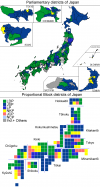-Snip-
Part 2
The 1992 United States presidential election was the 52nd quadrennial presidential election, held on Tuesday, November 3rd, 1992. Incumbent Democratic President Al Gore defeated Republican Former Senate Majority Leader Bob Dole of Kansas and Texas businessman Ross Perot in one of the closest elections in American history. President Gore's chances of re-election were hampered when the Democrats took losses in the 1990 midterm elections due to a Southern and Midwestern backlash against the President for "governing left of his campaign policies" and not addressing the Midwest farm crisis.
However the President managed to put himself back on the map with his swift reaction to Saddam Hussein's invasion of Kuwait in 1991, with Operation Desert Storm seeing Iraqi forces be pushed from the country entirely in only 30 days. At the dawn of 1992 it was obvious Senate Majority Leader Bob Dole of Kansas would be the Republican nominee, defeating challenges from both Pat Buchanan and Steve Forbes. He resigned from the Senate to focus on his campaign against the President.
Dole took Indiana Senator Richard Lugar as his running mate, hoping his rust belt credentials would be helpful to sway the region that had become disillusioned with President Gore's American Free Trade Compact or AFTC. (Even though Dole also supported the agreement)
Gore and Dole weren't alone however, as Texas billionaire Ross Perot also entered the race on a campaign against President Gore as an independent candidate, opposing free trade and taking a middle ground approach to social issues. Initially Perot led both candidates in the polls before suddenly dropping from the race and re-entering. The economic crisis continued to worsen and many thought for sure Dole would be swearing in January 1993.
By the fall the Gore campaign was playing catchup as fast as possible. To prove his credentials on social issues President Gore outlawed same-sex marriage in the Defense of Marriage Act and spoke out in favor of a moment of silence in schools for prayer.
Gore also triumphed in the third Presidential Debate, with Dole looking visibly confused at different points, leading voters to question his ability at his age. On the day before election day the polls showed the two candidates neck and neck.
On November 3rd President Gore narrowly won re-election in one of the closest races in the history of the United States. The state of Arkansas, a state many expected Dole to win as he swept the rest of the south, went to President Gore by a measly 1,2000 votes, mostly in part thanks to the charismatic Governor Bill Clinton campaigning in favor of the President. If the state had gone to Bob Dole it would've resulted in a hung Electoral College, which would've meant a Dole victory due to GOP control of both houses.
Many Republicans blamed Ross Perot for Dole's defeat, however most Perot voters preferred Gore or no vote over Dole in a race without the independent candidate. Dole also came in third place behind Perot and Gore in the state of Maine that Perot had won, so if Perot had not been in the race the state would've gone to Gore.
The election was the fourth in history in which the winning candidate did not win the popular vote nationwide, with Dole defeating the President in the popular vote by .2%. President Gore and Vice President Glenn were sworn into their second term on January 20th, 1993.
